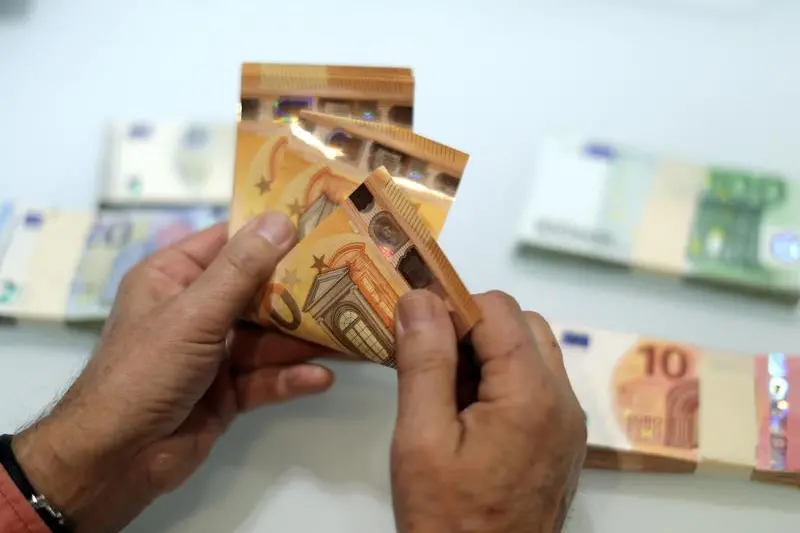PHOTO
The euro is trading at its highest this year against the dollar, emerging as a clear winner from the recent ructions in global currency markets that have unsettled a strong dollar and halted a relentless slide in Japan's yen.
Having broken decisively above the symbolic $1.10 level , the euro's more than 2.5% gain in August sets the currency up for its best month since November. Traders, distracted up until now by the yen's sudden surge after a surprise July 31 Bank of Japan rate hike and a broad-dollar pounding as expectations for U.S. interest rate cuts grow, are paying attention. After all, history shows $1.10 is not an easy level to crack and as recently as April, some analysts speculated the euro could weaken to parity. It's now the second best performing major currency versus the dollar this year after sterling. The gains, forecast to be modest from here, are nevertheless notable as U.S. Federal Reserve rate cut talk coincides with speculation that further European Central Bank easing could be limited by sticky service-sector inflation.
"It's a rate differential story," said Commerzbank currency analyst Volkmar Baur.
"Inflation is coming down on both sides (of the Atlantic), but the Fed is expected to move a little bit more aggressively on the way down, and that closes the rate spreads a little bit and gives way for a stronger euro." The ECB, which cut rates in June, could deliver at least two more 25 basis points reductions, market pricing suggests.
In contrast, traders see 94 bps of Fed cuts across its three remaining meetings this year -- implying three 25 bps moves, with a good chance of one larger one. That's a change of around 30 bps from early August; ECB pricing has moved much less.
This shift followed weak U.S. labour market data, which sparked recession fears and jolted stocks and bonds. Markets have since calmed, but policy easing expectations remain.
For sure, it's not just the euro that has strengthened against the dollar in August, but the single currency is where there are the fewest complications for traders looking for a relatively safe FX bet. The yen is volatile after the unwind of a massive carry trade. Sterling has gained less in August after a UK rate cut and French political risks, that hurt the euro in June, have eased.
"We've seen some risks taken out from the euro like the French election," said Salman Ahmed, global head of macro and strategic asset allocation at Fidelity International.
"It's now becoming a cleaner central bank story."
GETTING HARDER
From here however, the euro may struggle to make further headway.
It's at the top of recent trading ranges and there's less scope for rate differentials to shift further in its favour, said analysts.
Commerzbank forecasts the euro at $1.11 by year-end, unchanged from current levels. ING sees it at $1.12 in a month before falling back to $1.10 and BofA expects $1.12 by year-end.
"My view since the second quarter of 2023 was to play the trading range. You buy the euro at $1.05 and sell when it moves above $1.10," said Mathieu Savary, chief European investment strategist at BCA Research.
For some, this could even be it for the gains.
"These are the strongest levels for the euro you should expect between now and the end of the year," said Guy Stear, head of developed markets strategy at the Amundi Investment Institute, who reckons the case for further ECB cuts was more convincing than for the Fed. A recent euro zone economic rebound shows signs of slowing, while a gauge of German investor morale posted its strongest decline in two years in August.
In contrast, the next round of U.S. jobs data could show July's weak report was just a Hurricane Beryl driven blip.
Another complicating factor in the mix is the Nov. 5 U.S. presidential election. While there are many moving parts, analysts said Republican candidate Donald Trump's policies of higher tariffs and lower taxes would likely cause higher inflation, meaning tighter Fed policy and a stronger dollar. Rabobank's head of currency strategy Jane Foley noted the euro's recent rise came as his Democratic rival, U.S. Vice President Kamala Harris, gained in the opinion polls.
"What could really push euro/dollar above $1.10 and hold it there is a Harris victory and a U.S. slowdown," she said.
(Reporting by Sruthi Shankar in Bengaluru and Alun John in London, additional reporting by Yoruk Bahceli; editing by Dhara Ranasinghe and Toby Chopra)





















